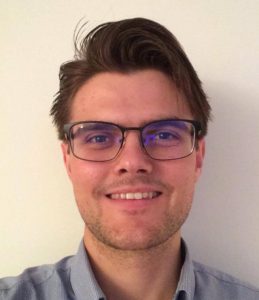 The National Sarcoma Awareness Project was launched in 2013 by a team from the Royal Liverpool and Broadgreen University Hospitals NHS Trust (funded by the Bone Cancer Research Trust) to raise sarcoma’s profile among medical students and junior doctors. Four years in, it has caught the imaginations of over a thousand participants—a new generation of potential sarcoma clinicians and researchers, which now includes me since I participated in the funded fellowship last year.
The National Sarcoma Awareness Project was launched in 2013 by a team from the Royal Liverpool and Broadgreen University Hospitals NHS Trust (funded by the Bone Cancer Research Trust) to raise sarcoma’s profile among medical students and junior doctors. Four years in, it has caught the imaginations of over a thousand participants—a new generation of potential sarcoma clinicians and researchers, which now includes me since I participated in the funded fellowship last year.
I recently discussed my involvement in the project, believing that any drive to improve sarcoma patient care must address the relative ignorance we, as a profession, have about sarcoma.
This is, perhaps, of no great surprise. Accounting for only 1% of cancer diagnoses, sarcoma is seldom discussed from the start of our medical training. There is no national undergraduate sarcoma curriculum and little formal teaching. Care is delivered from fewer than 20 national centres that most medical students will not rotate through, denying them valuable clinical experience alongside sarcoma specialists. A similar fate awaits many rarer diseases, which are considered to be overly esoteric and not worth inclusion. While it’s not feasible to expect that these diseases receive in depth study during doctors’ education and training, a basic understanding of the red flag features of soft tissue sarcoma, for example, seems not unreasonable.
It is early detection of these features that triggers prompt specialist referral when lesions are smaller and less likely to have metastasised—theoretically, improving survival. Unfortunately, for the past 25 years, the UK has seen no reduction in the interval between the onset of symptoms and diagnosis for sarcoma. The quarter of patients who undergo inappropriate excision of the lesion prior to referral to a specialist team is also unchanged.
While diagnostic delay is multifactorial, a lack of awareness among healthcare professionals seems particularly critical in the case of sarcoma. One study found that the crude proportion of patients with soft tissue and bone sarcoma who saw their GP at least three times before specialist referral was 41% and 32%, respectively, compared to a 23% average across all cancer types. This disparity remains true when compared to other rare cancers and is made all the more remarkable when you consider the relatively specific symptoms these patients present with, for example, an enlarging bony or soft tissue mass.
This low index of suspicion is particularly concerning in younger patients. Sarcoma accounts for 15% of cancers in patients under 25 years, and yet a recent UK survey reported that almost half of patients aged 18-35 were initially treated for another condition or reassured that their symptoms were “not serious.” Young doctors are not immune either as the recent passing of the inspirational Kate Granger reminds us.
My time with the Royal Marsden sarcoma team allowed me to observe other improvements we can make. The five year survival rate for patients with soft tissue sarcoma in England has only modestly improved from 48% to 56% over the past 25 years, with no improvement in bone sarcoma at all at 56%. Chemotherapy regimens depend on decades old agents, but small patient cohorts spread across many sarcoma subtypes make it difficult to run the trials needed to bring about changes to practice. The clinicians I met were working tirelessly to amend this.
Sarcoma medicine feels simultaneously pioneering and mentally exhausting. The curiosity that drove my involvement with the National Sarcoma Awareness Project granted me unparalleled exposure to this rare cancer. I wish all doctors had such an opportunity, but since that is not possible I can only call for sarcoma to feature more in medical education and training.
Thomas Oliver is a foundation year 2 trainee, based at University College Hospital, London.
Competing interests: I declare that I have read and understood BMJ policy on declaration of interests and I have the following interests to declare: I recently undertook a clinical fellowship sponsored by the Bone Cancer Research Trust.
Note: The Bone Cancer Research Trust has committed to funding the National Sarcoma Awareness Project for a further two years in 2016 and 2017.
If you are a final year medical student or F1/F2 doctor interested in taking part, please contact sarcoma.awareness@rlbuht.nhs.uk with your name, designation, and email contact. You will receive free e-learning resources and a link to the online questions. The top scoring participants will be given the opportunity to take part in funded short term clinical fellowships at a regional sarcoma centre to further their knowledge on sarcomas.
